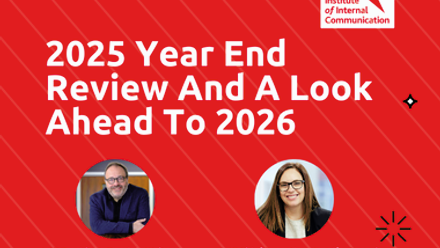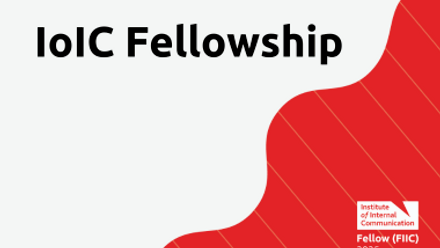Since COVID, I’ve noticed that live events leave me feeling pleasantly exhausted. Any place I meet and engage with interesting people and ideas requires a few days of mental processing and reflection to make sense of what I’ve seen and heard.

The 2024 IoIC festival was no exception.
Two days of inspiring keynotes, panel conversations, fireside chats, practical case-studies, workshops and debates provided so much food for thought that days later, I’m still reflecting on what I learned.
We kicked off with an introduction to the highlights of this year’s IC Index report, which launches next week. Unsurprisingly, with so much uncertainty and change in the world right now, trust has emerged as a pivotal issue.
Perceptions of trust at work intrinsically tie with colleague experience, engagement and, more widely, business performance. For internal communicators, it’s never been more important to understand trust and how it manifests in organisations. It’s also crucial to know what dismantles it.
Understanding the role communication plays in building and maintaining trust is essential. Internal communicators must deepen their understanding of the psychology of human relationships, belonging and connection.
This is urgent work. Not least when, as we heard from our opening keynote speaker, Dr. Paul Redmond, we now have four generations represented in the workplace.
Every generation is shaped by the prevailing socio-cultural trends of the time. As Generation Z enters the workforce, we are seeing, for the first time, the long-range impact of always-on smart devices and social media on human behaviour, attitudes and wellbeing. As Dr. Redmond pointed out, we live in an era of digital addiction and “continuous partial attention”.
The challenge to successfully communicate with perennially overstretched and distracted internal stakeholders can’t be underestimated. Internal communicators must work harder than ever to reach their audiences.
Attention is power. This demands a rethink of the role of internal communication moving forward. How do we build connection and community for greater collaboration, resilience and organisational adaptability?
Thrillingly, this presents the opportunity to do the work of our lives and reshape the scope of internal communication. Internal communication is the glue that will continue to bind and align colleagues as they face increasingly fast-paced and transient futures.
This sentiment was echoed by our second keynote speaker, Rohit Talwar.
Rohit presented us with a compelling vision for the future. By weaving together a range of technology trends, he offered a plausible future scenario of fulfilment and opportunity.
But, he warned, we will only get a positive future once we accept that it’s ours to create. And to create better futures, we must be sure of who we are now and what we want to achieve in our professional lives. We must understand our ‘why’.
Understanding why we do what we do consists of two parts. First, we must understand our context – the strategic objectives of our employer and what motivates our colleagues. Only when we understand these can we successfully design and execute internal communication campaigns that deliver against business goals.
Second, and perhaps more importantly, we must understand ourselves – our values, motivations and drivers.
This theme was explored further by our third keynote speaker, Dr. Naeema Pasha. As she explained, AI-enabled futures come with some big caveats.
The purpose of AI, we’re told by big tech, is to create efficiency and improve accuracy.
But unchecked, AI also has the capacity to cause unintended consequences. There are myriad ways in which AI could adversely impact society. We need only look at the way in which social media platforms have been misused in recent years to know this is true.
It’s incumbent on us all to think critically and examine the ethics parameters of AI-adoption. When integrating AI into internal communication strategies, we must ask ourselves who it might harm or exclude at every step.
This brings us back to the question of who we choose to be as internal communicators. What’s our role? What do we expect of ourselves and what do our colleagues and senior stakeholders expect of us? And what skills will we need to continue to deliver strategic value?
In uncharted business landscapes, it’s impossible to grasp how fundamental critical thinking, open, inclusive communication, collaboration, complex problem-solving and innovation are to the creation of sustainable futures.
Nurturing environments of trust is vital work and the human antidote to increasingly digital futures. Trust is the glue that keeps colleagues connected and on track.
Our final festival keynote was Mike Bates – a former counter-terrorism operations specialist and human intelligence expert.
He talked of the value of courage, clarity, credibility and composure. And the importance of having a personal mission.
The 2024 IoIC festival has left so much to reflect on. Internal communication has a golden opportunity to lead on the delivery of mission-critical, meaningful work that matters. The future of colleague experience depends on it.





